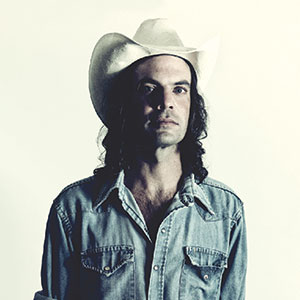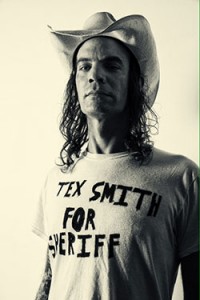
Josh Buckley will be celebrating the release of his new album at the Lizard Lounge on Sept.4.
By Blake Maddux
Singer, songwriter, and guitarist Josh Buckley was born at Boston’s now-defunct St. Margaret’s Hospital in 1973. He later graduated from Emerson College with a degree in audio and video engineering.
Buckley released Living Man’s Blues, his first solo album, in 2005. That same year, he moved to Somerville and formed the band Gilded Splinters, which describes itself on Facebook as “Rolling Stones and Hank Williams with a touch of the Who.” They recorded three records and toured locally before moving to Austin, Texas, in 2011.
Late last year, Buckley was “back home” in the Boston area for a couple of weeks. Rather than sit around and vegetate, he decided to write and record a second solo CD. The result is Blind Side of the Heart, for which he will be holding a release party at Lizard Lounge in Cambridge on Thursday, September 4. The official release date is October 10.
Buckley spoke to The Somerville Times by phone from Austin.
Somerville Times: Was this a batch of songs that were written specifically to make an album out of, or have some of them been rattling around in your head for a while?
Josh Buckley: With the exception of the Doug Sahm cover (At the Crossroads) at the end and one other one, they were all written within about a 10-day period. The song I sing with my friend Christy Hays (Angle From Liberty), I’ve been playing that song for a while. I’ve had that song since probably like 2008.
ST: How did the recording and mixing of Blind Side of the Heart proceed?
JB: It was a really cool situation. I came back home for a little bit to clear my head and see some friends. I hadn’t been back in a while and I was kind of, you know, dealing with some stuff and just taking a quick break from Austin. I didn’t know what I was going to do, and my friend Andy Plaisted said, “Well, let’s make a record.” And I said, “Alright.”
It was my favorite experience as far as recording goes. It’s very organic. The only thing that was working against us really, and that ended up working for us, was the fact that I had to be back in Austin. So there was a deadline, and we didn’t have a lot of time to do it. I did a pre-production meeting with Andy, who played drums on it and engineered it, and I’d say co-produced it with me. We were up at his mom’s house shingling a deck, of all things. As we were doing that we were talking about the record and kind of figuring out some of the parts. We changed a few things here and there, but for the most part it was just written and recorded – done. And that was it.
ST: So it was conceived of and completed in your old stomping grounds of Somerville, rather than your current ones in Austin, TX?
JB: It was recorded in two days at Andy Plaisted’s studio in Somerville. We did two different recording sessions. One session was me, Laurence Scudder on viola, and Jim Haggerty on upright bass. And there’s three songs on the record that are pretty stripped down, so we did those first, all live. We got those done and then a week or so later, or maybe a couple of days later, the guys from the band came in and we knocked out six songs in a night.
The very interesting thing was that I left before the album was completed, so then Dave Westner at Woolly Mammoth Sound in Waltham mixed it. We would just email back and forth from Austin to Boston. He would email me the mixes and I would listen to them and take notes, which was cool because I wasn’t there to f*ck it up! Once my part of the record was done, I walked away, and kind of just put it in the hands of other people, which I think was great to do.
It got a little tense there at the end because there was a time constraint. We finished, and then three hours later I was on an airplane going back to Austin.
 We just played the songs and they recorded them primarily live. On a lot of the songs, it’s just the take. Vocals and everything – just one take. I don’t mean this in a bad way, but none of the guys really knew the material that well. I sent it to them and a couple days later they were in the studio recording it. I think that has such a major part of the feel of the record, that nobody really knows where it’s going, you know? During the recording of the songs I’m actually playing with the band and we’re all just kind of hoping it works. You can’t write that.
We just played the songs and they recorded them primarily live. On a lot of the songs, it’s just the take. Vocals and everything – just one take. I don’t mean this in a bad way, but none of the guys really knew the material that well. I sent it to them and a couple days later they were in the studio recording it. I think that has such a major part of the feel of the record, that nobody really knows where it’s going, you know? During the recording of the songs I’m actually playing with the band and we’re all just kind of hoping it works. You can’t write that.
ST: Other than bassist Jim Haggerty and your fellow Austin resident Christy Hays, who else appears on Blind Side of the Heart?
JB: From the band The Blue Ribbons, it’s James Rohr, Jef Charland, Mike Castellana, Laurence Scudder, and Andy Plaisted. And then I had Jenee Halstead and Danielle Miraglia come in and do some background and harmony singing. It was a pretty cool cast of characters.
It was a labor of love for a lot of people. I didn’t have a lot of money to begin with, and everybody was kind of just throwing their hat in the ring. It was a great reminder of the music community in Somerville. Musicians will step up and donate their time and their talent for a friend who’s going through some stuff, and they just want to help a fellow musician get through whatever they’re going through. It was a great honor. They all wanted to do it. They all wanted to be there, and it comes out in the music.
ST: You moved to Austin in 2011 with the other members of your band The Gilded Splinters. Do you still play with them?
JB: We’re technically still a band, but we’re all just so busy right now. We played together for seven years as a band in Boston. When we moved down here, I think we all kind of silently agreed that we wanted to do other stuff. I was definitely getting burnt out on trying to keep a band together, and I just wanted to go off and do my own thing for a while.
There’s no bad blood. We all love playing together. I just think that now we’re all kind of interested in pursuing some other things that we weren’t able to do as a band.
ST: Which musicians or albums influenced the sound of this album?
JB: Not anyone in particular. Not to sound like one of those guys who says, “Oh, it didn’t have any influences,” because of course it did. But it was one of those things where the writing happened so fast.
I wanted it to be pretty sparse. Maybe Phases and Stages by Willie Nelson, and I guess Blood on the Tracks by Bob Dylan and Neil Young’s Harvest. I guess those are the albums. I wasn’t trying to replicate them or anything, but I like the overall tone of them. I like their consistency.
ST: What was life as a musician like in Somerville for the six years that you lived in Somerville?
JB: It was a lot of fun. It was great. We were all able to cut our teeth and get our chops down. It was great, but it was hard because you only have so many venues playing music, and all those venues are pretty much buddy-buddy with the bands that play there. They’ve got it locked down. And it’s well-deserved. These guys deserve every bit of what they get, because they’re hard-working dudes.
That being said, they have those gigs, and you kind of have to wait for them to break up or die to move ahead in Boston. After six or seven years of playing and doing regional touring, I felt that I had gone as far as I could in Boston. I felt that I had kind of hit a flatline. And we were all just ready to move. We were all ready to do different things.
ST: How do the music scenes in Somerville and Austin differ from one another?
JB: The musical community in Somerville is very close-knit. It’s big but it’s small. I kind of miss that. Like I said about making the record: all these guys stepped up. I feel like there’s much more of a family kind of feel back home. It’s a lot more competitive down here, I think. Back home, it’s much more of situation where everyone just kind of plays with everyone. Down here it’s a lot more cutthroat.
Josh Buckley will be sharing a bill with Township and Smith & Weeden at the Lizard Lounge on Thursday, September 4. Doors open at 8:30 p.m. Tickets are $8 in advance and $10 at the door.















Reader Comments